- Home
- Kimberly Derting
The Offering Page 8
The Offering Read online
Page 8
An eerie sensation settled over Brook, prickling her skin and causing her scalp to pucker as every hair stood on end. She looked up too, her eyes tracking over the same places Eden’s had, finding the same hollows in the trees, the same forks in the branches, tracing the same twists and gnarls and bends until she realized there was nothing there. That she’d been spooked by words, and words alone.
Spirit stories, like the ones she and Charlie and Aron had told when they were younger, as each had tried to convince the others of hauntings and apparitions and ghoulish occurrences.
The same way Eden had tried to convinced Brook with her tale of eavesdropping forests.
Nonsense, Brook told herself. But she slowed her horse anyway, deciding to keep closer to Charlie now despite her doubt.
Because regardless of all else, and no matter what Eden and Charlie insisted, Charlie was still her queen. And Brooklynn was there to defend her.
vi
Sometimes nightmares were real.
That was my first thought when the imposing razor-wire fences came into view. Even in the glow of the colossal torches that had been placed at uneven intervals along the perimeter of the settlement, the enclosures themselves were intimidating. The metal was oxidized from weather and time but still appeared rugged and sturdy. The barbed spikes protruding from the fence were so long and so sharp that I was sure they could impale an entire human torso. And they likely had, from everything I’d heard about these places.
From what I could see, the buildings behind the fence line were no less daunting. No more inviting. I shuddered for their inhabitants, wondering what it must have been like . . . before.
I wondered too what it was like now. Now that the work camps had been dismantled. Now that the unwanted children who lived here were no longer wards of a barbaric system in which they were worked to the brink of collapse, and then tortured as a punishment for their lassitude.
Still, it wasn’t exactly what I’d imagined—the settlement—nestled deep in the forest and hidden away from the rest of the world. I supposed I’d imagined a place more barren and desertlike. More like the vast regions of the Scablands, although I knew there were camps there as well. This was only one of many.
As far as I was concerned, there were too many of these camps in Ludania. Camps where children who’d lost their parents, or whose parents could no longer provide for them, or children who’d been forced to leave home because their parents were the more dangerous option, had been sent to live under Sabara’s rule. Here they had labored and toiled until they’d reached the age of legal consent, at which point they’d been reassigned to society, where they’d been required to labor and toil under a different kind of regime.
I’d already outlawed the work camps, but like all my decisions, it had caused a scandal of sorts. There were always those who were opposed to change, even when it benefited the greater whole of society. Even when it benefited those without voices of their own.
My plan was to reorganize the camps into something more humane, a place where children would be fed and cared for and educated. A safe haven. Many of those who’d been in charge of the camps had been detained and arrested for their crimes against the children they’d been in charge of.
Those who were found liable would be grateful that they lived under my rule, where the worst I would do was exile them to the Scablands. Sabara’s gallows were unforgivable.
“Are you sure it’s safe to be here?” I asked, following Eden’s lead and tethering my horse to a branch.
Eden glanced up once more, just as she’d done when we’d been riding earlier, when she and Brooklynn had been discussing me as if I couldn’t overhear them, when I’d been nervous and talking too much. I’d ignored them then, but now I followed her gaze, wondering what she was searching for.
The sky had shifted from pale and cold to a frigid field of black. There were hints of a bright moon and pinprick stars that made intermittent appearances from between the trees that had grown denser and made it harder to navigate.
And then I saw something, in the branches high above me. At first just the barest shift. A quiver so minor that I nearly missed it against the dark canvas of night. But as I waited, it came again. Stronger this time.
No, not stronger. Louder. It came like a sound, a crackling whisper. A rustling.
I tried to pinpoint it, to track it with my eyes, but it was as fast as it was slight, and the darkness seemed to swallow it up before I could reconcile it.
“There,” Eden said, pointing to the place I hadn’t been able to find.
“Where?” Brook was standing behind us now, trying to see what Eden had.
I held my breath, waiting, my heart pounding too hard. And then it came again . . . shifting, rustling . . . and a leap. “I see it,” I exclaimed. But as quickly as I’d made the announcement, whatever it was vanished amid the backdrop of black foliage and tree limbs.
“He’s there,” Eden explained, her voice whisper soft, and I tried to read her mood, which was as dark and ambiguous as the night itself.
I frowned. “He? It’s a he?”
“What’s he doing up there? He standing guard or something?” Brook asked, her voice matching Eden’s, quiet and low.
But Eden ignored us both and instead cupped her hands around her mouth. She didn’t call out to him, not in words, anyway. What she did was make a sound—a whistling sound like none I’d ever heard before. It wasn’t that of a bird or a train or the kind of whistle a person makes when they purse their lips and blow. It was more like that of an instrument, the kind carved from old, hand-rubbed wood. It was deep and mournful, and beautiful.
And it was nothing I could decipher.
After she finished, there was a moment of silence . . . a long, still moment during which my pulse beat just a little too fast as I waited.
Then came the response. An equally resonant and melancholy whistle from above us. From the exact spot Eden had just been pointing to.
“You can come down now,” she called up to the trees. “You’ve had your fun.”
There was nothing subtle about the way the leaves rustled after that. It was as if the very ground were trembling. As if the earth beneath our feet were trying to spit the soaring trees right out of it. And it wasn’t just the one tree, the one Eden had pointed to. It was all of them, as every leaf and every branch and every offshoot of every branch shook at once.
When the boy landed in front of us, I jumped back, bumping into Brooklynn, who instinctively thrust me behind her. I didn’t have time to be offended, or to worry that she looked too protective and might give us away by her actions, because I was too shocked by the boy’s sudden appearance to think of any of those things. Eden didn’t so much as flinch, however.
The boy was gangly and thin, but not small, exactly, making it hard to pinpoint his age. But it was also the smeared grease or mud that coated his face and arms—everywhere his skin was exposed—that made it difficult. I couldn’t see the ridges of his brow or his jaw, couldn’t tell if he’d passed that divide between child- and manhood. His clothing, rags of varying fabrics that seemed to be patched together, was as grimy as everything else about him, and I couldn’t help thinking it was meant to be some sort of camouflage. That all this filth was meant to keep him hidden among the forest foliage.
But before I could imagine why he would need to blend into the trees, another pair of feet hit the ground with a definitive thud. Another mud-covered body faced us. Followed by yet another . . . and another . . . and another. Until it seemed as if we were faced with an army of soldiers, each staring at us from behind a screen of grime and grit.
The boy who’d landed first was also the first to step forward.
Eden met him halfway.
Neither spoke for an instant, as if silently appraising the other. Sizing each other up. And then Eden said to him, “You weren’t fooling anyone. I saw you about a thousand paces back.” Her voice was flat, but there was something charged about her, an anticipa
tion or an expectation that hadn’t been there before. Almost like she were on the abyss, hovering on the verge of delight.
But why? I couldn’t help wondering. What was it about this place, about this meeting, that could cause her to feel such joy?
“And I saw you two thousand paces ago. You’re losing your touch,” the boy answered. His voice was lower than I’d expected, and it made me aware that he was older than I’d first imagined, despite his narrow build.
Eden’s reaction wasn’t at all what I’d anticipated, as she threw her head back and laughed. The boy’s face cracked then, literally, as mud crumbled from around his eyes when he smiled at her, his lips parting to reveal the pink skin.
That was when I noticed it, the odd coloring of his eyes—those peculiar eyes. Coloring I’d seen before. Coloring I’d always found unnerving, most especially when they were focused on me.
Black, like a bird’s. Black as night.
Black . . . like Eden’s.
She reached out and grabbed the boy then, not caring that he was caked from head to toe in dirt so thick, it probably reached to his bones, and she dragged him against her as she wrapped her arms around him and kept laughing. She laughed into the top of his crusty hair, and she may have even kissed him too. It was hard to tell, since the boy began to wriggle within her grasp. But Eden was unyielding in her affection, unwilling to release him just yet, and she clutched him and buried her face in his head and neck, still laughing.
“Stop!” the boy insisted, and when she didn’t at first, his muffled shouts climbed into his throat, making him sound more childlike than he had just moments earlier. “Eden, stop! Stop!”
She relented, but only reluctantly. She loosened her grip but didn’t release him quite yet. “Fine, fine,” she muttered, but there was nothing but humor in her voice, and I couldn’t remember ever hearing Eden sound so . . . so jovial before. Not even with Angelina. “You don’t have to be such a baby.”
“I’m not a baby,” the boy grumbled, but it came out so quietly, I almost didn’t hear him. “Just lemme go.” He motioned behind him with his head, his voice dropping even further. “They’re watching us.”
Eden’s grin grew, and even without sensing her, I could tell she was enjoying herself more than she should have been. She shoved him away from her, causing him to stumble. He nearly tripped over his own feet before catching himself and coming to stand before his scruffy legion of followers.
The boy straightened his shoulders and then addressed those gathered in front of him, some of them having grown restless, shifting and scratching and whispering among themselves. His voice sounded more grown-up now than it had when he’d been caught in Eden’s arms. “We have guests,” he announced, and I could feel all those too-bright, unblemished eyes that blinked at the three of us from beneath the mud-laden faces. I wondered who they thought we were. And then he continued, and suddenly his relationship to Eden became strikingly clear as he turned to face her, his hands landing on his skinny hips. “Some of you might remember my sister . . . Eden.”
Eden had assured Brooklynn and me that we’d be perfectly safe for the night. Right before she’d deposited us in a bunker no bigger than a shed and left us alone with a group of ragged-looking kids who watched us as if they’d sooner strangle us in our sleep than share one of their beds with us.
Fortunately, they were more accommodating than they appeared, and they willingly parted with two of the bunks that were scattered around the planked floor, giving us each a place to sleep.
I wasn’t sure if we were taking bunks of kids who’d been displaced to accommodate us, or if the bunks had already been empty, but when I asked, all the girl told us was, “You sleep here.” It was the same answer she’d given when I’d tried rewording the question, and when I’d finally given up and thanked her, and again when Brook had asked her for an extra blanket. Just “You sleep here” in her strange, tired lisp that made her S sound like “th.”
I couldn’t help thinking the girl didn’t know any other phrases.
“S’not her fault, you know.” The voice came from several bunks down, after Brook and I had finally settled in.
I made sure that my cloak and blankets were sufficiently covering me, diffusing any light that might try to escape while I slept. I couldn’t take the chance that news of the glowing queen had traveled all the way to this forsaken work camp.
Brook had insisted on pushing our bunks together, despite the fact that none of the others were. She said we needed to sleep back to back, to stay on guard, even though Eden had assured us we could trust these people, and even though, as far as I could tell, they were nothing more than children. We hadn’t seen anyone who looked older than Eden’s brother, whose name we’d learned was Caspar.
“What’s not her fault?” Brook asked before I had the chance.
“Selena. Not her fault she can’t tell you nothin’ else. She’s a Repeater. It’s all she can do, what with all the beatings and the messin’ around the docs did on her head.” The girl speaking was younger than Caspar. I’d seen her in the forest when they’d all still been covered in mud, before Caspar had sent them down to the river in the dark to rinse off before turning in for the night. It was her hair that gave her away; even caked with mud, the brilliant fiery strands had been impossible to hide.
The way Caspar had given the order, it was clear he was the one in charge around here. “Where are the adults?” I asked. “Shouldn’t there be someone here to make sure you’re all okay?”
Moonlight poured in through the dirt-caked windows, and I could see the girl’s outline as she sat cross-legged on her bunk, the way Angelina so often sat. Her hair was still damp and hung in drooping waves around her face. She stiffened at my words, and I felt as if I’d somehow insulted their leader without meaning to do so. “Caspar’s doin’ a fine job. Better’n the rest. The doc was arrested and taken away,” she explained indignantly. “And so was the chief—that’s what he made us call him, the warden who used to be in charge. Never knew his real name, just ‘the chief.’ He liked hurtin’ us.
“At first when those people came around askin’ us questions, we were all too scared to answer, too afraida the chief. But then Caspar said we had to. Said if we didn’t tell ’em what they wanted to know, the chief’d keep hurtin’ kids forever. So we did.” She shifted, so she was sitting sideways on her bunk. She kicked her legs, swinging them back and forth and back and forth as she spoke. “The day they took the chief away was the best day ever.” She glanced up, and her eyes sparkled in the pale moonlight. “Best day ever,” she repeated, a dreamy, faraway smile on her lips.
I couldn’t imagine what the chief must have done to these kids, and my skin flushed as I remembered the other girl and the way she’d simply repeated the same words, “You sleep here,” over and over again.
Gritting my teeth, I fought to contain my reaction. I couldn’t risk my skin blazing to life if I didn’t keep my emotions under control. I clutched the fabric closer to my face so I could peer through a narrow opening.
“There’s no way they’d just allow Caspar to run the place. How did that end up happening?” Brook shot back.
The girl’s feet stopped swaying, and she looked around, nodding smugly, and I realized that the others must have been listening too. A roomful of children all lying in their cots and listening to our conversation like it was a bedtime story. “We chased ’em off.”
Brook sat up, more than a little interested now. “What do you mean, ‘chased them off’? Who? How many of them?”
The girl’s face screwed up as she concentrated. “Three,” she answered. “They sent three more to run the place, after the chief.”
“Four!” piped up another voice from somewhere down the row—a little boy’s voice.
The girl paused and counted on her fingers, then nodded once more. “Yep, that’s right. Four,” she corrected with a quick jerk of her head. “Four that we had to persuade to leave.”
“Why?” I wond
ered aloud, hating that I might somehow be responsible for putting others like the chief in positions of authority over these children. “Were they all so terrible, like the chief?”
She waved the idea away. “Nope. They was fine. We just didn’t need ’em, did we?” She wasn’t asking me now. She was asking the other children, and the response was resounding.
They were all in agreement as “no” echoed through the bunkhouse. They most definitely did not need adult supervision. Caspar was their leader. He’d take care of them.
“So.” I was almost afraid to ask my next question. “Where did they all go exactly? The adults, I mean.”
The fiery-haired girl shrugged. “Don’t know, don’t care. Long as they don’t come back.” She started swinging her legs again. “I’m Ku,” she announced, grinning widely at me, and I could make out a wide gap between her two front teeth.
“I’m Cassia,” said another girl.
“Santiago,” said the little boy who’d corrected Ku.
And then they were all saying their names. All of them at once, a snarl of voices that twisted together, making them sound like one jumbled mess.
These were the children who’d been sent to the work camps. Abandoned by parents and relatives—by society—and now they’d banded together to form a new family. Taking care of one another.
And now taking care of us.
“I’m Cha—” I stared to say, but Brook elbowed me so hard in the ribs, I gasped, reminding me that even my real name was too dangerous. I faltered, trying to think of something else to say, struggling for a lie—a name I could offer in place of my own.

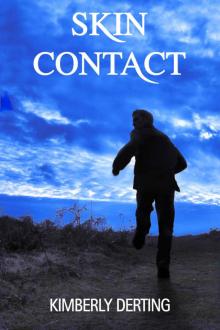 Skin Contact
Skin Contact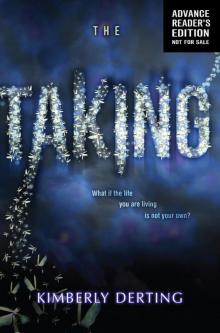 The Taking
The Taking The Replaced
The Replaced The Body Finder
The Body Finder Desires of the Dead
Desires of the Dead Unbound
Unbound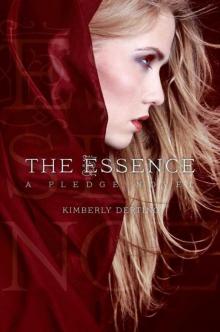 The Essence
The Essence The Last Echo
The Last Echo Unbound (The Men of West Beach Book 2)
Unbound (The Men of West Beach Book 2)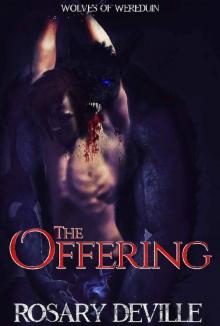 The Offering
The Offering Undressed
Undressed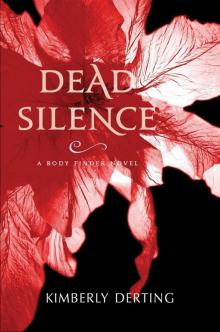 Dead Silence
Dead Silence The Last Echo: A Body Finder Novel
The Last Echo: A Body Finder Novel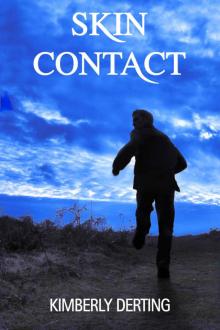 Skin Contact (Body Finder)
Skin Contact (Body Finder)